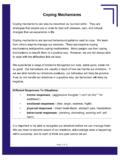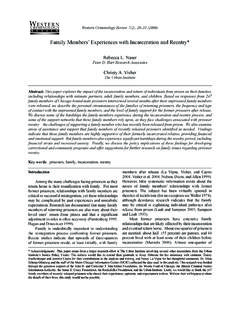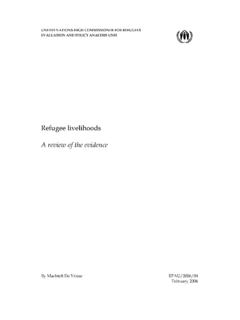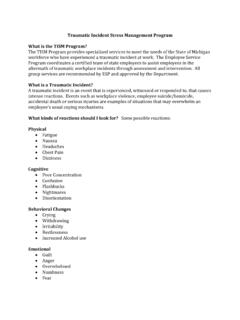Transcription of Defense Mechanisms among Our Students
1 Defense Mechanisms among Our Students By Margot Phaneuf, RN, Introduction We often believe that only psychiatric patients, especially psychotics, use Defense Mechanisms . This idea is widespread, but it is interesting to note how Defense Mechanisms function in the lives of rather sane people like you and me. We are also led to wonder which factors underlie certain (annoying) behaviours expressed by our Students . Why do they wait until the last minute to study and seem unconcerned when they know that exams are just around the corner?
2 Why do Students fail to realize that spending too much time on recreational activities and non-academic work leads them straight to failure? The manner in which they express certain Defense Mechanisms illustrates how they cloud reality to avoid suffering, at least for a while. and to mediate unproductive aspects of our own personality to achieve personal growth. e d fense : a complex theory such as psychoanalysis on a daily basis contains its own set of risks, but its value is undeniable. Psychoanalysis makes it easier to grasp and understand (in itself a difficult task) our behaviour.
3 Analyzing human behaviour through the Defense Mechanisms expressed by others allows us to acquire a great deal of knowledge about ourselvesDominique Friard defended this approach when he wrote: The study of Defense Mechanisms goes beyond that of psychopathology and psychotherapy. The study of Defense Mechanisms is common in areas such as prevention (including that of aggressive behaviour and violence), health education, medicine for physical disorders or the hiring of human resources. (Friard, Dominique. Les m canismes d Consulted on February 14, 2007).
4 What are Defense Mechanisms ? e reserved to describing and explaining abnormal behaviour expressed by psychotic patients. se : Mechanisms were first described in 1874 by Sigmund Freud, the father of psychoanalysis and the most illustrious of Austrian psychiatrists. He identified strategies that we use to protect ourselves from suffering. At the time, Defense Mechanisms werThe definition used at the time and which is still in use today is that of "a defensive mechanism developed by the ego when under pressure by the superego and external reality which enables us to fight anxiety.
5 " (M canismes de d fen). 1 The human mind in all of its vast complexity elaborates Defense Mechanisms so that it can function in the face of problems or setbacks in society and life in general. Development and dynamics of Defense Mechanisms It is essential to first understand that Defense Mechanisms emerge from a conflict between two personality components. First, there is the superego, which represents an individual s moral anatomy, the internal psyche wherein the notions of good and evil and punishment and reward lie.
6 The superego is inherited from parental authority. conflict with one another. Through the superego, the individual is conflicted by social constraints, pressures and subsequent guilt. As a result, the individual may be severely or unavoidably dragged upwards to a level that is considered noble, pure or perfect. The superego controls the id by putting the two components inSuperegoEgoIdPersonalityPersonalityPer sonality: components: componentsand interactionsand interactionsRequire-mentsofrealityOn the opposite spectrum, the id drags an individual downwards by overcoming the constraints and taboos of the superego.
7 The French term a is an approximate translation of the German term Das Es used by Freud and its English counterpart (id). It roughly means something that is undifferentiated, an impulse, and a source of energy that is often associated with a physical desire or the libido which in itself is associated with an individual s sexuality. The ego is an unconscious component which mediates the id and superego. The ego strives to find a balance between the id's instinctual requirements and the moral and social prescriptions of the superego. Patrick Juignet described this phenomenon when he wrote: The ego acts as a regulator and as a controller.
8 Its main purpose is to manage the individual's various and contradictory necessity such as the conflict between drives and reality (2001, p. 46). The ego is not only associated with intelligence, but also with shrewdness and the willingness to possess. The ego is in contact with the outside world and has control over reality. The superego guides the ego and the id provides its energy. The ego satisfies within certain boundaries the needs of the id. The individual attempts to defend himself in the context of a conflict between the id and the superego, to meet the requirements of reality, and also when facing an internal or external threat to his bio-psychological integrity.
9 The individual uses the ego to erect Mechanisms , thoughts, feelings, behaviours (usually unconsciously to forget, minimize, deform or project reality onto another), and so on to protect himself against stress, anxiety, loss of self-image, a conflict or any other threat. These are the Defense Mechanisms that he erects to protect himself. 2 What do Defense Mechanisms defend us from? Anxiety, anguish Genuine fears Loss of self-esteem Negative affects: jealousy,bereavement, hostility, etc. Socially unacceptable drives:aggressiveness, sexuality The superego s judgments andforbidden what are we Against what are we defending ourselves?
10 Defending ourselves? Implemented Implemented mechanismsmechanisms Afiliation, coping Projection, compensation Rationalization, denial Reaction formation Repression, avoidance Identification, activism Intellectualization Omnipotence, regression Sublimation, displacement Anticipation, conversion Altruism, resilience Humour, splitting, etc. Clinical importance of Defense Mechanisms Defense Mechanisms are prevalent in our lives. They are generated by conflicts in our social or family relationships, by existential problems in our evolution towards maturity, and by academic or professional setbacks.








